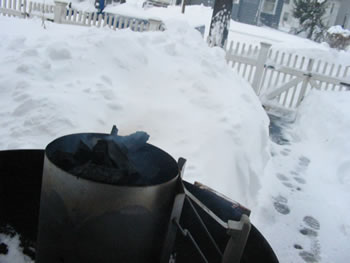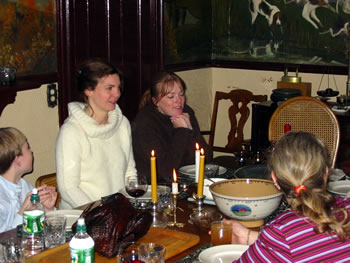They weren't all fools
Among the worst, and most popular, historical myths is the belief that people used to be idiots. It's always tempting for historians to fall into this because the historian knows how things turned out, and because our inner adolescents perpetually remind us of what fools are parents were.
One symptom of this mistake is sudden descent from something very interesting into unreadable politics:
Orientalism serves as a safety valve for gender friction by providing imagery for male wish fulfillment and idealization. This function was signaled early on by Hiram Power's The Greek Slave, which depicts a nude woman chained and sold into harem slavery by the Turks during the Greek War of Independence. This unprecedented sculpture came to epitomize the nineteenth century cult of pure womanhood, with its ideals of chastity, piety, and quietude.
This is Holly Edwards channeling Edward Said, and though her catalog of Noble Dreams, Wicked Pleasures: Orientalism in America 1870-1930 is full of delightful work, the text is often marred by this sort of carping. The artist's politics were not ours -- or at least not Said's -- and so we have to hold the artist (and the buyers, viewers, and critics who were all fellow travelers) in a certain contempt. (Edwards does do an important service in explaining why France's imperial issues were not America's, and that Orientalism in American painting does not have to mean the same thing that it meant in Paris)
is full of delightful work, the text is often marred by this sort of carping. The artist's politics were not ours -- or at least not Said's -- and so we have to hold the artist (and the buyers, viewers, and critics who were all fellow travelers) in a certain contempt. (Edwards does do an important service in explaining why France's imperial issues were not America's, and that Orientalism in American painting does not have to mean the same thing that it meant in Paris)

Mark Bernstein,
Guantanamo Study,
Poser sketch after
The Greek Slave
But if of politics we now would speak, what were the artist's and the viewer's politics, anyway? No, the Greek Slave isn't the girl next door. If she were, this would be unbearable. Terrible things happen; art gives you some distance. Sooner or later, it is going to happen here , and it's easier to plan and to prepare if you begin by thinking about what's happening over there.
, and it's easier to plan and to prepare if you begin by thinking about what's happening over there.
And somehow, speaking of politics, we've managed to forget that we're in New England in 1843 and we're talking about people who knew slaves, people who could (and did) say that some of their best friends had been slaves, people who were 17 years away from busting up the last, best hope of mankind and walking out of their New England parlors all the way to Georgia, in order to destroy slavery at any cost.
If you convince yourself that those old folks were fools and louts who just wanted to do the male gaze thing to the Orient, you're fooling yourself. They may have been wrong, there were lots of things they didn't know, but they weren't merely greedy simpletons and perverts.

In Carpeaux's Les Quarte Parties Du Monde (Luxembourg Gardens, maquette in the Orsay), we have four women -- Europe, Africa, Asia, and America, supporting the globe. Africa's leg is shackled, and America just happens to be stepping on her chain.
I spent a couple of hours this afternoon, sketching The Greek Slave in Poser, to sort out two different ways we're distanced from this girl. One is intentional -- she's a hunk of silicon dioxide. The other, though, is partly an accident of time. Her hair is antique, and that's a powerful source of distance. (Anne Hollander points out that, in historical movies, the stars almost always have modern hair.) And her body is antique, too; nude statues, from the Greeks on, are almost always distorted by the forces of the underwear that the subject is not wearing . (Poser has the same problem -- and it gives her the abs of a kouros -- but because it's modern we don't see it so prominently)
. (Poser has the same problem -- and it gives her the abs of a kouros -- but because it's modern we don't see it so prominently)
The unexpectedly interesting parts of this exercise in new media remediation were the hands. I wanted to change the right arm just a little, moving the girl a little away from the column and letting her put more weight on it. Hiram Powers probably couldn't do this because the marble wouldn't withstand the shear force, but we can benefit from the magic of virtuality. The Poser 5 slave isn't conscious of the corset she's not wearing, she's accustomed to jeans or skirts or to the little black dresses that Coco Chanel will invent for her granddaughter, and I wanted some muscle tension somewhere.
The left hand, I thought, was a bit of silly 19th-century nonsense. It turned out to be a headache, because small changes in gesture end up reading very differently, and I didn't want to wind up in Fleshbot. It was murder to get anything close to acceptable, and to do that I pretty much abandoned the attempt to mimic the original angles. (There's a reason you never see hands in user interface icons: nearly every gesture is obscene, somewhere)
It's a hell of a note that we're now more puritanical than the 19th century Boston Brahmins. But, let's face it, we are. Gender friction? Male wish fulfillment? The viewers were often women, the tastemakers were even more often women. Those women didn't have much political power, but they had some -- and they could easily have preferred something else. And the whole point of the sculpture is that you're obviously supposed to identify with the slave girl.
And this is becoming the sort of thing of which plain folks, in 21st century America, dare not speak.








